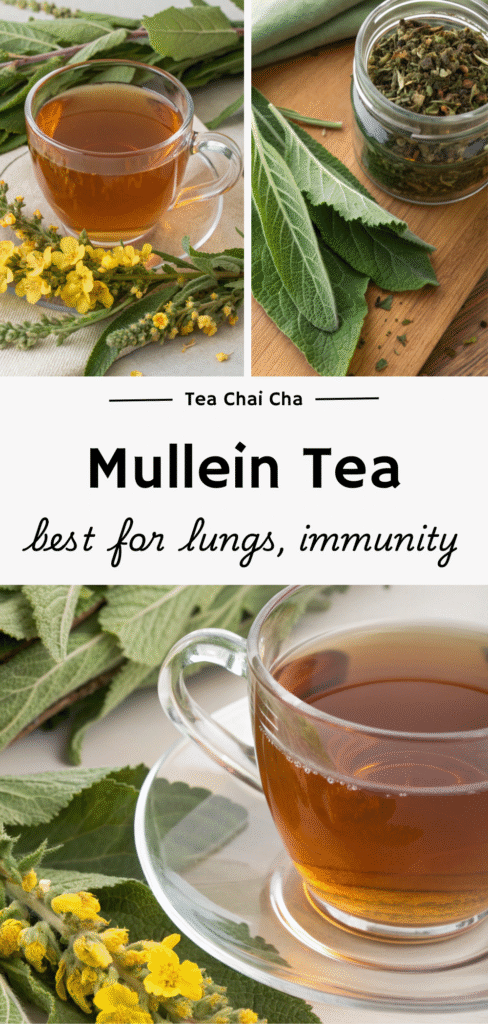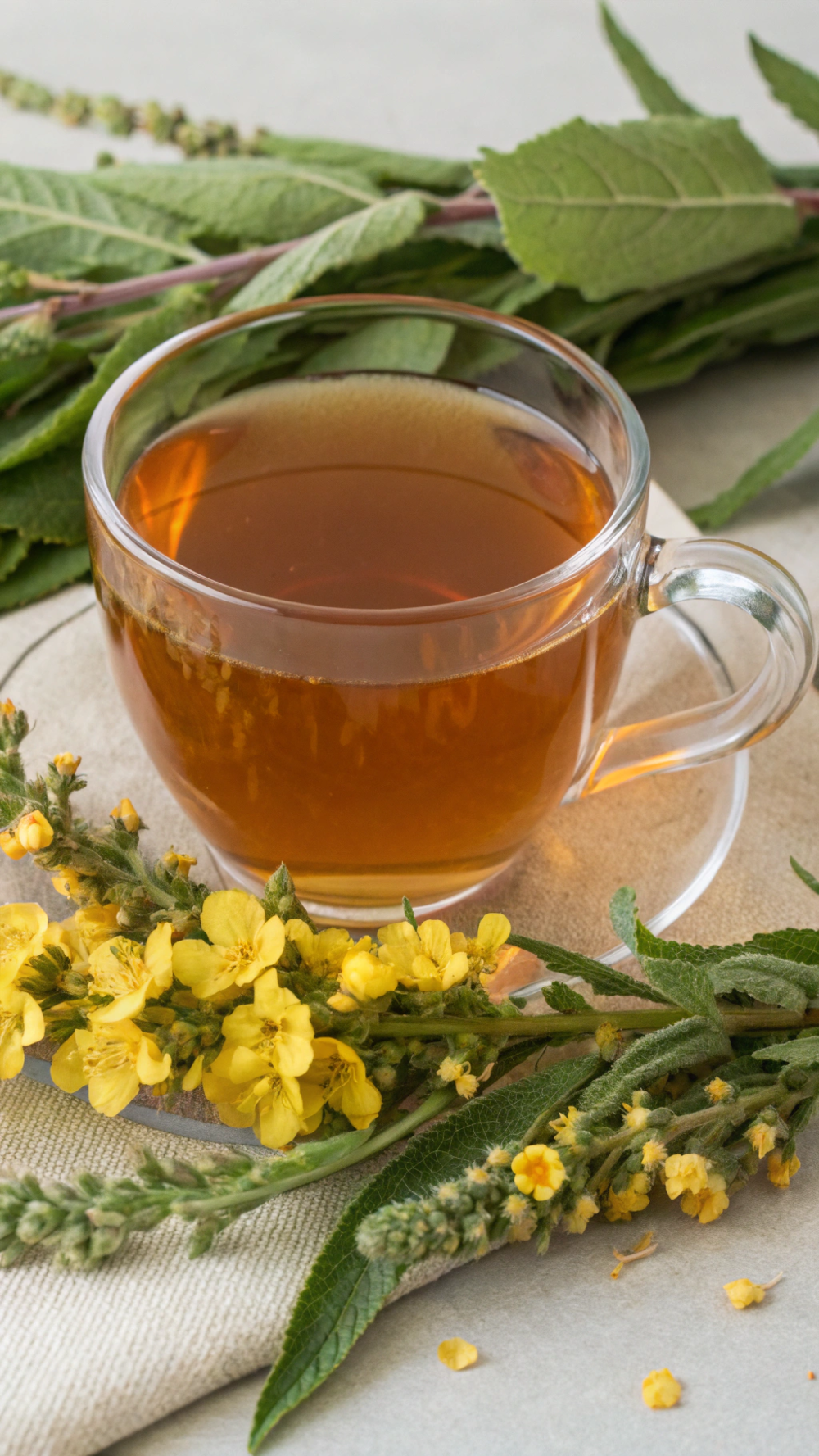Ever come across a gem as rare as a home-brewed tea that’s been cherished for centuries in ancient healing practices?
That’s the enchanting tale of mullein tea, a potion with countless wellness wonders. But hold your horses, because I am about to spill the tea on how to make mullein tea with easy recipe and sip it right!
What Is Mullein?
Mullein is a robust plant native to Europe and Asia. It is easily recognizable by its fuzzy leaves and towering yellow flower spikes.
But what sets it apart is its rich medicinal properties, which can work wonders for your health.
Now, you may be wondering: how did people come to discover the power of this humble plant?
The Historic Role of Mullein
Mullein’s journey from a simple plant to a renowned herbal remedy is fascinating. For centuries, it has been used to treat various ailments across cultures.
Imagine, a plant that has traveled through time, offering healing and comfort!
Mullein Tea Flavor
Mullein tea has a mild and soothing flavor profile. The taste is often described as subtle, slightly earthy, and somewhat floral. Some people also detect a hint of sweetness in the tea.
Overall, the flavor of mullein tea is gentle and pleasant, making it a soothing and comforting beverage to enjoy.

When Should You Make Mullein Tea?
In the rhythm of life and the changing of seasons, is there an ideal time to brew this herbal elixir?
The simple answer is that you can enjoy mullein tea at any time of the day. But let’s dive deeper and understand when this tea can truly shine.
Mullein Tea for Winter Wellness
Traditionally, mullein has been hailed as a boon for the lungs and the lymphatic system.
With winter winds come the chills and common respiratory discomforts.
As the temperatures drop and our lungs yearn for warmth and care, a cup of mullein tea can come to the rescue. Its soothing properties can make winter’s grip a little less harsh.
Mullein Tea for Dry, Scratchy Coughs
If your cough feels dry and scratchy, as if your throat is bristling with every breath, it might be time to reach for mullein tea.
This herbal remedy has the potential to soothe an overzealous cough reflex and provide some relief.
Also read – How Much Mugwort Tea to Start Period Naturally
Mullein Tea in Dusty Conditions and Allergy Season
Our surroundings greatly impact our wellness. Times of environmental stress, like dusty conditions or the peak of allergy season, can stir up discomfort.
Similarly, situations like wildfires can affect our respiratory health. These are moments when a cup of warm, soothing mullein tea can offer solace.
So, in essence, the perfect time to brew mullein tea is when you need some comfort and relief.
Whether it’s the changing seasons or a pesky cough, mullein tea is ready to lend its soothing touch.
And, let’s not forget, when the plant is in full bloom in the summer and early fall, it’s a great time to harvest your own mullein for an even more personal tea experience.
How to Make Mullein Tea – DIY Mullein Tea Recipe
Making mullein tea is a straightforward process. But here are some points you should be aware of:
Preparing Mullein for Tea
You can make mullein tea from fresh leaves or dried leaves or flowers of the mullein plant. To prepare mullein for tea, you’ll need to gather or purchase dried mullein leaves or flowers from a reputable source.
You can also harvest and dry the leaves or flowers yourself, ensuring they are free from any contaminants.
To dry mullein leaves or flowers, hang them in a warm, dry place with good air circulation. Once dried, store them in an airtight container away from sunlight until you’re ready to use them.
Brewing Temperature for Mullein Tea
When preparing mullein tea, use boiling water to brew the tea. The optimal brewing temperature is 212°F (100°C), which is the boiling point of water.
Pour the boiling water over the dried mullein leaves or flowers and let them steep for about 10 to 15 minutes to extract the beneficial compounds and flavors.
After steeping, strain the mullein tea to remove the leaves or flowers before serving. You can drink the mullein tea warm or let it cool down and enjoy it as an iced tea.
Mullein Tea Recipe
Recipe by Tania FaysalCuisine: Other world cuisine2
servings5
minutes5
minutes2
kcal10
minutesSoothe your senses with a comforting cup of mullein tea, made from fresh or dried mullein leaves simmered in boiling water and sweetened to taste.
Ingredients
Fresh or dried mullein leaves: 2 tablespoons
Water: 2 cups
A tea strainer or cheesecloth
Honey or sweetener of choice: to taste
Directions
- Clean the mullein leaves: If you're using fresh mullein leaves, rinse them thoroughly under running water.
- Boil water: In a pot, bring the water to a rolling boil.
- Add mullein leaves: Add the cleaned fresh or dried mullein leaves to the boiling water.
- Simmer: Reduce the heat and let the tea simmer for about 15 minutes.
- Strain and sweeten: Use a strainer or cheesecloth to separate the leaves from the tea. Sweeten your brew with honey or your sweetener of choice.
Also read – What Does Jasmine Milk Tea Taste Like?
There you have it, your cup of mullein tea is ready to be savored!
Now that you’ve brewed your first cup of mullein tea, how can you get the most out of it?
How To Enjoy Mullein Tea
Mullein tea can be an adventure for your taste buds if you know how to enjoy it properly.
Tips for Enjoying Mullein Tea
The mild flavor of mullein tea makes it a versatile beverage. You can enjoy it as is or add a bit of honey, stevia, or a squeeze of lemon to enhance its flavor. Why not make it a cozy evening routine or an afternoon pick-me-up?
Pairing Your Mullein Tea
Why not turn your tea-time into a feast? Pair your mullein tea with a slice of lemon cake, a bowl of fresh fruit, or a handful of nuts for an exquisite snack time experience.
Health Benefits of Mullein Tea
It’s time to delve into the heart of what makes mullein tea such a gem: its health benefits.
Respiratory Relief Power of Mullein Tea
Mullein tea has long been lauded for its potential respiratory benefits. From soothing coughs to easing congestion, it is often a go-to herbal remedy during the cold and flu season.
Mullein Tea for Better Rest
For those struggling with sleep issues, mullein tea may provide some relief. Its mild sedative properties can potentially aid in promoting a good night’s sleep.
Gut Health and Mullein Tea
Beyond respiratory relief and sleep support, mullein tea is also known to support digestive health, helping soothe common ailments such as indigestion or constipation.
What Are The Side Effects Of Mullein Tea?
While mullein tea offers numerous benefits, it’s also crucial to be aware of potential side effects.
Potential Mullein Tea Side Effects
When it comes to sipping on some mullein tea, it’s all natural and herbal, but like any other remedy, it’s good to know what’s what. Some people might get a bit of a funky reaction, like allergies kicking in.
Just make sure to tune in to what your body’s saying and if you got any worries, don’t hesitate to chat it up with a healthcare pro.
How to Minimize Potential Side Effects
Safe consumption of mullein tea involves starting with small quantities and gradually increasing as your body adapts.
Wrap Up!
We’ve taken a delightful stroll through the wonderland of mullein tea – from its fascinating past and the art of brewing it just right, to all the good stuff it does for our well-being and the precautions we should keep in mind.
So, as you set off on your very own mullein tea adventure, make sure you relish every single sip, treasure those moments, and let Mother Nature work her magic on you.
Related
A fan of herbal teas? Check out these DIY herbal tea recipes!
Frequently Asked Questions (FAQs)
Can you make mullein tea from fresh leaves?
Yes, you can make mullein tea from fresh leaves. Simply wash the leaves thoroughly, chop them up, and follow the same steps as when using dried leaves. Remember, fresh leaves may give a slightly different flavor profile compared to the dried ones.
How to make mullein tea taste good?
Mullein tea has a mild flavor that can be enhanced according to your preference. A bit of honey or a squeeze of lemon can add a lovely twist. For a more aromatic experience, try adding a cinnamon stick or a few cloves while steeping.
Can I drink mullein tea everyday?
When it comes to mullein tea, it’s generally all good for regular sipping. However, start with just a bit, test the waters and see how your body vibes with it. Like any herbal brew, moderation is the secret sauce.
What is the best way to take mullein for lungs?
Mullein tea is often the preferred method to harness mullein’s potential benefits for lungs. Its soothing warmth can be particularly comforting for respiratory discomfort. Remember, consistent use over time is usually more beneficial than occasional high doses.


